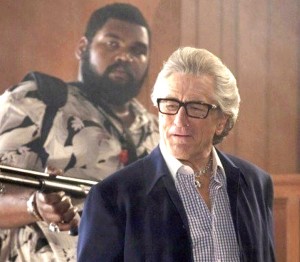‘Bag Man’ takes your money and runs
In 2003, John Cusack starred in a dark gem of a horror thriller called Identity. The film, helmed by future Walk the Line and 3:10 to Yuma director James Mangold, revolved around 11 apparent strangers who take shelter in a Nevada motel during a storm, only to discover that there’s a deranged killer hiding in their midst. The film used this deceptively generic premise — one heavy with allusions to Agatha Christie’s seminal whodunit Ten Little Indians and Hughes Mearns’ eerie poem “Antigonish” — to subvert audience expectations, defy genre conventions and deliver a diabolical denouement that succeeded in being simultaneously absurd and totally unnerving.

It’s in the bag · Academy Award winner Robert De Niro plays Dragna, a crime lord, who hires Jack, played by John Cusack, to recover a mysterious parcel in David Grovic’s thriller The Bag Man. – Photo courtesy of Red Granite Pictures
Now, 11 years and dozens of forgettable direct-to-DVD releases later, Cusack is checking into another motel with an alarmingly high body count, but the results couldn’t be more different. Writer-director David Grovic’s The Bag Man, formerly known by the even more innocuous title Motel, is already an early contender for 2014’s dullest, dreariest, most derivative excuse for a movie, an insipid Tarantino knockoff starved of all original thought, honest emotion or even basic technical competence. Attention, screenwriters: If a scene involving Robert De Niro waxing poetic about his favorite episode of Full House fails to earn a laugh, that’s a pretty good indicator that something has gone horribly wrong.
Cusack stars as Jack, the “hit man with a heart of gold” inspired — some would say lifted wholesale — by the actor’s role in the 1997 assassin comedy Grosse Pointe Blank. De Niro, meanwhile, appears as the enigmatic crime boss Dragna, Jack’s frequent employer and, based on his snazzy pompadour, a die-hard Bruno Mars fan. The plot, such as it is, kicks in after Draga hires Jack to recover a mysterious parcel for him, expressly forbidding his underling from looking inside it, a plot development that should prove mildly intriguing to those who have never seen Pulp Fiction, Kiss Me Deadly or even that episode of Spongebob Squarepants in which Spongebob becomes obsessed with the contents of Patrick’s jealously guarded “secret box.” Spoiler alert: The MacGuffin lurking in Jack’s bag have nothing to do with embarrassing photos from a Christmas party.
After recovering the bag in a shootout that leaves one of his hands a mangled mess, Jack holes up in a seedy motel run by the fidgety, wheelchair-bound Ned (Crispin Glover, the only actor who isn’t defeated by the film’s often cringe-inducing dialogue) to care for his injury and await further instructions from Dragna. He’s there literally five minutes before running into Rivka (Rebecca Da Costa), a blue-haired hooker dressed in a torn Wonder Woman costume. Rivka wants to use Jack’s deadly skill set to escape from her abusive employers, namely Lizard (Sticky Fingaz), whose defining character trait seems to be his snakeskin eye patch, and a surly dwarf named Guano (Martin Klebba). At first Jack resists, but who can deny true love when it’s this forced and uninteresting?
Even though De Niro and Cusack have become notorious for lending their considerable talents to bottom-rung dreck like this, it’s still pretty mystifying to watch them appear in a movie whose script peaks in quality when a character named Jack actually says, “You don’t know Jack.” Not even Arnold Schwarzenegger, the Laurence Olivier of one-liners, could hope to elevate a stinker like that. Cusack, meanwhile, stumbles through the film in a disheveled stupor. De Niro, hidden behind designer lenses and a Liberace wig, seems surprisingly engaged, probably because he only has to appear for a handful of scenes. The sooner he reunites with Martin Scorsese for The Irishman or The Winter of Frankie Machine, the better. Da Costa, a Brazilian model and actress, has a fierce, unfocused energy that might prove more interesting in future projects. To be fair, none of the performances here are flat-out terrible. The fault lies with the slick, self-satisfied script.
The Bag Man also suffers from a troubling undercurrent of misogyny. When Dragna breaks the nose of his female assistant over an innocent accounting error, the camera eagerly zooms in, lingering on the woman’s quivering, tear-streaked face for several beats longer than necessary. Later, when a trio of crooked cops detains Cusack and Da Costa, a barely clothed Da Costa is brutalized by a leering backwoods sheriff during a long, clumsy sequence that stops the movie cold, derailing any forward momentum the story had managed to pick up during its mildly diverting second act. A clumsy final reveal also raises disturbing implications about Jack’s relationship with his recently departed wife. Precious little here actually makes sense, and all of it seems cobbled together from bits and pieces of far better movies, especially an ending that appears determined to rip off Seven and the Swedish version of The Girl with the Dragon Tattoo simultaneously.
Simply put, life is too short to waste on recycled garbage like The Bag Man.

